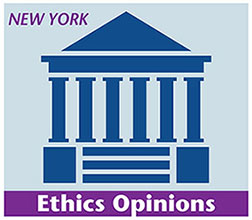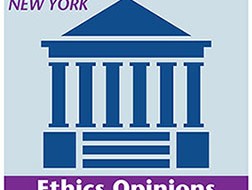Recent N.Y. Ethics Opinions: March 2016
By Tyler Maulsby, Associate, Frankfurt Kurnit Klein & Selz
Here are summaries of ethics opinions issued in November and December 2015. The opinions were issued by the NYSBA Committee on Professional Ethics. NYLER will continue to provide updates on new ethics opinions issued by these and other ethics committees in New York State.
For information about how to obtain an ethics opinion from the NYS Bar Association Committee on Professional Ethics, please visit http://www.nysba.org/Ethics/.
NEW YORK STATE BAR ASSOCIATION OPINIONS
NYSBA Ethics Op. 1072 (Nov. 2015)
Ethical Obligations When Partnering with Foreign Lawyer
In Opinion 1072 a New York lawyer wishes to partner with a Japanese “benrishi,” a professional licensed to practice certain forms of intellectual property law in Japan. According to the Opinion, while benrishis must pass a bar exam that focuses solely on intellectual property law, they are not required to have a law school degree. Opinion 1072 reasoned that “the mere fact that a foreign ‘lawyer’ is licensed in another country is not by itself sufficient to [conclude] that a New York lawyer may permissibly form a partnership with the foreign lawyer.” Instead, the New York lawyer must also “engage in an independent inquiry to confirm that the educational requirements for the foreign lawyer are equivalent to those for a New York lawyer and that such a partnership would not compromise the New York lawyer’s ability to uphold the ethical requirements of this State, including those governing attorney-client confidentiality.” While Opinion 1072 recognizes that there may be support for the proposition that a benrishi has sufficiently similar educational and ethical requirements to New York lawyers, the Opinion ultimately concludes that both determinations are fact-specific and the individual lawyer must conduct his own “independent inquiry.” The Opinion also noted that any partnership between a New York lawyer and a benrishi must also comply with the substantive laws of New York and the ethical rules and substantive law in Japan.
The Opinion is available at: http://www.nysba.org/CustomTemplates/Content.aspx?id=60197
NYSBA Ethics Op. 1073 (Nov. 2015)
Conflict of Interest with Defense Attorney Serving on District Attorney’s Conviction Integrity Committee
Opinion 1073 addresses whether a criminal defense attorney may continue to practice criminal law while simultaneously serving on a “Conviction Integrity Committee” (Committee) formed by the local District Attorney. The Opinion concludes that because the Committee’s function is not to prosecute individuals, there is nothing “inherently incompatible” with a criminal defense lawyer serving on the committee and continuing her criminal defense practice. If the members of the Committee were part of the District Attorney’s “firm,” then any conflict with the District Attorney’s office would be imputed to the individual lawyers. The Opinion reasoned, however, that because the Committee only issues non-binding recommendations, all members of the Committee are volunteers, and they do not have access to information about any of the District Attorney’s cases other than those they are reviewing, the members of the Committee are not part of the District Attorney’s “firm” within the meaning of Rule 1.10.
The Opinion is available at: http://www.nysba.org/CustomTemplates/Content.aspx?id=60200
NYSBA Ethics Op. 1074 (Nov. 2015)
Conflict of Interest with Part-Time Lawyer Working for Department of Social Services
In Opinion 1074, a part-time lawyer for a county Department of Social Services also maintains a solo private practice. The lawyer, for the Department of Social Services, handles paternity and child support matters, liens, Medicaid issues, guardianships, and occasionally child abuse and neglect cases. The lawyer wishes to participate in the County’s Assigned Counsel Program, which provides counsel to indigent individuals in criminal and Family Court proceedings. The lawyer does not intend to accept representations in child abuse and neglect cases. The Opinion concludes that the lawyer could accept assigned counsel appointments in Family Court and in criminal matters “provided that the Department or others in law enforcement with whom the lawyer works are not materially involved.” In such a scenario, even though a conflict of interest may exist under New York Rule 1.7(a), the Opinion reasons that there is a reasonable probability that the lawyer could still provide competent and diligent representation to each affected client in accordance with Rule 1.7(b). However, the lawyer may not accept assigned clients “in matters within the Department’s jurisdiction” or in matters where the lawyer would “be required to cross-examine law enforcement officials with whom the lawyer is now engaged as a part-time lawyer at the Department of Social Services or has recently done so.”
The Opinion is available at: http://www.nysba.org/CustomTemplates/Content.aspx?id=60201
NYSBA Ethics Op. 1075 (Dec. 2015)
Use of Trade Name by Legal Consulting Service
Opinion 1075 addresses whether a retired judge seeking to provide legal consulting services to lawyers may use a trade name for her business. Under New York Rule 7.5(b), a lawyer in private practice may not use a trade name or a firm name “containing names other than those of one or more of the lawyers in the firm.” Opinion 1075 explains that the analysis turns on whether the retired judge’s contemplated business involved the private practice of law. While the definition of the “practice of law” is a legal question the Opinion concludes that it is safe to assume that “the business of advising lawyers how to best prepare for arguments in court in specific cases is the practice of law.” As a result, the retired judge may not use a trade name for her proposed business. The Opinion also notes that, as a result, the proposed business must also comply with all other ethical rules including those governing conflicts of interest.
The Opinion is available at: http://www.nysba.org/CustomTemplates/Content.aspx?id=60756
Get CLE Credit for this month’s articles (March 2016).
DISCLAIMER: This article provides general coverage of its subject area and is presented to the reader for informational purposes only with the understanding that the laws governing legal ethics and professional responsibility are always changing. The information in this article is not a substitute for legal advice and may not be suitable in a particular situation. Consult your attorney for legal advice. New York Legal Ethics Reporter provides this article with the understanding that neither New York Legal Ethics Reporter LLC, nor Frankfurt Kurnit Klein & Selz, nor Hofstra University, nor their representatives, nor any of the authors are engaged herein in rendering legal advice. New York Legal Ethics Reporter LLC, Frankfurt Kurnit Klein & Selz, Hofstra University, their representatives, and the authors shall not be liable for any damages resulting from any error, inaccuracy, or omission.
Related Posts
« How to Lose Your Legal Fee, Part 1: Excessive Fees Masking Tapes: An Analysis of the Law of Secret Recording in New York »







